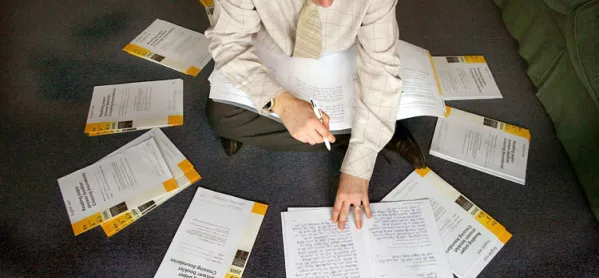Teachers can give up marking without any detrimental effect on students, according to an English teacher who has done just that. In fact, he says students are better off if teachers ditch the ticks, coloured pens and stock feedback phrases.
Writing in the 7 October issue of TES, London-based Matt Pinkett argues that teachers are “spending too much time ticking, flicking and dicking about in the children’s books and it simply isn’t fair. On us or on them.”
“According to the Department for Education’s Workload Challenge report of 2015, the majority of teachers believe that marking is something that takes ‘too much time’,” he writes. “Some spend 20 hours per week marking books. Yet, worryingly - given this rather large allocation of time - teachers deem marking to be the second most ‘unnecessary and unproductive’ task they undertake; narrowly beaten only by data entry and analysis.”
Pinkett, fed up with this situation, devised what he deems to be a better way: “Last year, I decided I wanted to have more time to do fun things like eating, sleeping and gouging my eyes out. And so, apart from the once half-termly assessment that is treated to the credit of my cursive, I have abandoned written marking.
“It works like this: twice weekly, midway through a lesson, once I’ve set the students off on an extended writing task (18 minutes minimum), I haul a desk to the front of the classroom and sit myself down on a chair under the whiteboard, facing the class. Once the pupils have marvelled at the ease and skill with which I have lifted what must surely be a cumbersome desk, they start working, and I start calling them up.
“One by one, students ‘come up’ and talk me through some of the work in their exercise books. They turn the pages and read sections of their efforts to me.”
Pinkett then delivers verbal feedback based on the work and this interaction. He explains how this works in detail - and the evidence to underpin his decision, in the full article.
A better way?
Doesn’t his method do a disservice to the students who have spent time slaving over the work only for it possibly not to be looked at? Pinkett argues not.
“What is a bigger indicator of the respect I hold for my students: a clumsily articulated comment that tries to both praise their efforts, explain misconceptions and make suggestions for improvement, dished out simply because that’s what teachers have always done? Or having a conversation? A conversation with the facial expressions, eye contact and the rhythms and cadences of speech that exist only in an interchange between two people who are involved in the creation of something that could be great?”
He believes his method is applicable to all subjects and stages, too.
To teachers carrying piles of exercise books home for yet another weekend of marking, the idea will no doubt appeal. Whether it is applicable to all teachers as Pinkett believes remains to be seen, but there is only one way to find out…
This is an edited article from the 7 October edition of TES. Subscribers can read the full article here. This week’s TES magazine is available in all good newsagents. To download the digital edition, Android users can click here and iOS users can click here
Want to keep up with the latest education news and opinion? Follow TES on Twitter and like TES on Facebook




